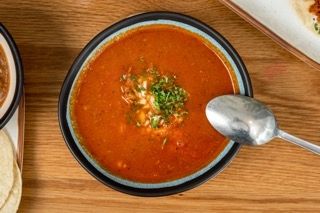Choose best mexican westchester NY restaurants for mouthwatering cuisine
Is Mexican Food Healthy And Balanced? Unloading the Nutritional Conveniences of Typical Ingredients
The question of whether Mexican food is healthy and balanced welcomes an expedition of its typical ingredients. Beans and corn act as foundational staples, rich in healthy protein and fiber. Avocados offer helpful fats, while numerous natural herbs and spices add flavor and wellness advantages - New York Times rated. With each other, these components produce a tapestry of nutrition. The healthfulness of Mexican food typically depends on preparation techniques and part sizes. What duty do these elements play in establishing its overall nutritional value?
The Power of Beans: Protein and Fiber-Rich Staples
Although usually overlooked, beans serve as a foundation of Mexican food, offering a wide range of nutritional advantages. Rich in protein, they are a superb plant-based alternative for those looking for to fulfill their nutritional protein needs. This high healthy protein content supports muscle repair work and development, making beans vital for both meat-eaters and vegetarians alike. In addition, beans are an extraordinary resource of nutritional fiber, which assists in food digestion and promotes a sensation of fullness, possibly assisting with weight administration.
The variety of beans made use of in Mexican recipes, such as black beans, pinto beans, and kidney beans, adds to a diverse flavor account and can boost meals nutritionally. Beans are low in fat and have essential vitamins and minerals, including magnesium, folate, and iron. With each other, these qualities make beans an important component, supplying both sustenance and nutrition in typical Mexican fare.

Corn: a Versatile Grain With Nutritional Benefits
Corn stands out as a versatile grain essential to Mexican cuisine, celebrated not just for its culinary applications yet additionally for its outstanding dietary account. As a key component in dishes like tortillas, tamales, and pozole, corn supplies essential nutrients that add to a balanced diet plan. Rich in carbohydrates, it works as a substantial energy resource, while likewise being low in fat, making it a desirable option for numerous nutritional needs.
Moreover, corn is an excellent source of nutritional fiber, which assists in food digestion and advertises satiation. It includes significant amounts of vitamins such as B-complex vitamins, which are vital for basal metabolism. The presence of antioxidants, especially carotenoids, adds to overall health by lowering oxidative stress. In addition, corn is gluten-free, satisfying those with gluten sensitivities. Overall, the dietary benefits of corn underscore its significance in standard Mexican food and its role in a healthy diet regimen.
Avocados: Healthy Fats and Nutrients in Every Bite
Avocados play a substantial function in Mexican cuisine, complementing dishes with their velvety texture and abundant flavor. Past their cooking charm, avocados are commemorated for their outstanding nutritional profile. They are an abundant resource of healthy and balanced monounsaturated fats, which can help reduced negative cholesterol levels and assistance heart health. Additionally, avocados are packed with vital vitamins and minerals, including potassium, vitamin E, and B vitamins, adding to general wellness.
The high fiber material in avocados help food digestion and advertises satiation, making them a useful enhancement to any dish. Their distinct nutrient make-up can additionally my response support skin health and give anti-inflammatory advantages. Including avocados into traditional Mexican recipes or appreciating them as a standalone treat can improve both flavor and nutrition, demonstrating why they are a cherished staple in Mexican cuisine. In general, avocados supply a scrumptious way to take pleasure in healthy fats and vital nutrients in every bite.
Herbs and spices: Flavorful Health Boosters
While enjoying the rich about his tastes of Mexican food, one can not ignore the important function that spices and natural herbs play in improving both taste and health and wellness. Ingredients such as cilantro, oregano, and chili peppers not just contribute to the vivid taste account however also give substantial health and wellness benefits. Cilantro is known for its purifying residential or commercial properties, assisting to remove heavy steels from the body, while oregano is packed with antioxidants and possesses anti-inflammatory effects.
Chili peppers, a staple in lots of Mexican dishes, include capsaicin, which has been linked to enhanced metabolic process and discomfort relief. Additionally, flavors like cumin and coriander support food digestion and might aid in blood sugar level guideline. Integrating these flavorful wellness boosters into meals not just boosts the cooking experience yet additionally promotes general health, making Mexican cuisine not just tasty, but likewise nutritionally helpful.
Standard Cooking Methods: Enhancing Nutrition and Taste
Typical cooking techniques in Mexican food play an essential duty in improving both nourishment and flavor, as they typically prioritize classic methods and fresh ingredients. Strategies such as nixtamalization, where corn is saturated and prepared in an alkaline service, not just boost the nutrient profile of tortillas yet also enhance their digestibility - churros. Furthermore, the usage of slow-moving food preparation methods, like cooking or braising, allows tastes to fuse perfectly while maintaining the honesty of the ingredients

Regularly Asked Inquiries
Are Mexican Food Portions Commonly Larger Than Various Other Foods?
Mexican food portions are usually bigger than those of numerous other cuisines. This characteristic reflects traditional eating techniques, highlighting communal sharing and hearty meals, which can lead to an extra substantial serving size in general.
How Does the Prep Work Technique Affect Healthiness of Mexican Food?
Preparation approaches greatly affect the healthiness of Mexican food. Techniques such as cooking or steaming preserve nutrients, while frying can raise harmful fat content. Selections of ingredients and cooking styles eventually determine total nutritional worth.
Can Mexican Food Be Customized for Details Nutritional Restrictions?
Mexican food can without a doubt be tailored for specific nutritional constraints. Replacements, such as using corn tortillas for gluten-free diet plans or including more vegetables, make it possible for individuals to appreciate traditional flavors while accommodating various dietary requirements.
What Are Typical False Impressions Concerning Mexican Food and Wellness?
Usual false impressions regarding Mexican food consist of the idea that it is naturally harmful, excessively hot, and entirely focused on fats. Actually, traditional dishes usually feature healthy ingredients and can be customized to different nutritional requirements.
Are There Healthier Choices at Mexican Restaurants?
Healthier choices at Mexican dining establishments often include smoked meats, beans, and fresh veggies. Choosing meals that emphasize whole ingredients and preventing hefty sauces can result in a more healthy eating experience, advertising overall well-being.
The variety of beans made use of in Mexican meals, such as black beans, pinto beans, and kidney beans, adds to a diverse taste account and can enhance meals nutritionally. Avocados play a significant duty in Mexican food, matching meals with their luscious appearance and abundant taste. Integrating avocados right into conventional Mexican dishes or enjoying them as a standalone snack can boost both taste and nutrition, showing why they are a beloved staple in Mexican food. While enjoying the rich flavors of Mexican cuisine, one can not ignore the essential role that spices and herbs play in enhancing both taste and health and wellness. Standard cooking techniques in Mexican food play a vital function in boosting both nutrition and flavor, as they usually focus on fresh ingredients and classic methods.